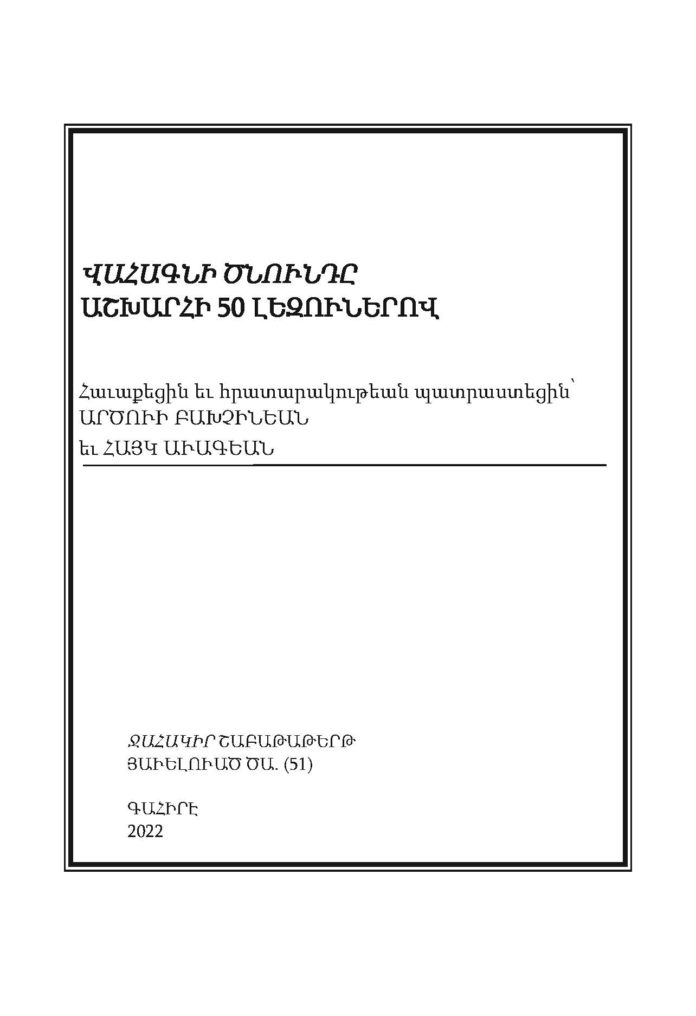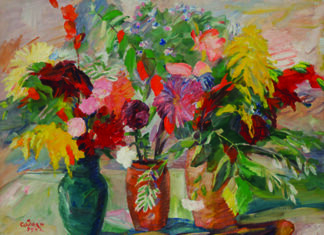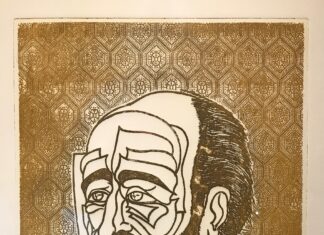CAIRO — On November 19, the presentation of a new book, ‘The Birth of Vahagn’ in 50 Languages,” compiled by Artsvi Bakhchinyan and Haig Avakian, took place at Bulukdanian Hall in Cairo, in the presence of the compilers. This is the 51st volume of Cairo’s Tchahagir Armenian-language weekly’s supplements, launched in 2016.
The most ancient extant Armenian song, known as “The Birth of Vahagn” and preserved due Movses Khorenatsi’s work The History of Armenia, is one of most beloved and popular examples of Armenian literature. An expression of the singing tradition of Goghtan province (currently in Nakhichevan, Azerbaijan), it depicts the birth of Vahagn, the deity of fire, thunder, and war worshiped in ancient Armenia. The literary original reached us without music.
“The Birth of Vahagn” is also one of the most frequently translated Armenian poems. For the first time we find it translated into the Latin language in 1736, published in London as a part of Movses Khorenatsi’s work prepared by the Whiston brothers.
Cairo musicologist and philologist Haig Avakian came up with the idea to collect all published translations of “The Birth of Vahagn” in a volume, as one of his numerous and varied literary projects. He is the main author or editor of various collections of materials published as the aforementioned supplements to Tchahagir. He collected all available hitherto published translations in 20 languages (Arabic, Bulgarian, Czech, English, Farsi, French, Georgian, German, Greek, Hungarian, Italian, Latin, Romanian, Russian, Serbian, Spanish and Turkish). Later his friend and colleague from Armenia, philologist Artsvi Bakhchinyan – author of number of studies in history and culture, with some experience in multilingual publications – joined him providing three other published translations (Polish, Portuguese, and Swedish) and arranging new ones in 27 more languages, using his global network of friends and friends of friends.
There is a certain tradition of multilingual publications among Armenians. Already in 1810, the Mkhitarists of Venice published the 12th century poet Nerses Shnorhali’s “In Faith I Confess” prayer in six languages. They then multiplied the number of languages which by 1871 reached 36. In 1986 in Yerevan the poem of the seventh century poet Davtak Kertogh was published in seven languages. On Artsvi Bakhchinyan’s initiative, Armenian writer Elda Grin’s short story “Hands” was published in 35 languages (2010) and English-language poet Hovhanness Pilikian’s poem “The Sea Scene on My Mother’s Day” in 19 languages (2012). In 2019, Yeghishe Charents’s famous poem, “I Love My Sweet Armenia’s Word” was published in 35 languages.
“The Birth of Vahagn” in 50 Languages includes not only translations, but also versions in Eastern and Western Armenian. With this edition, Armenian poetry has been translated into some languages for the first time, especially in the languages of the Far East (Thai, Laotian, Khmer), as well as in an African language (Lingala, the language of Congo).









